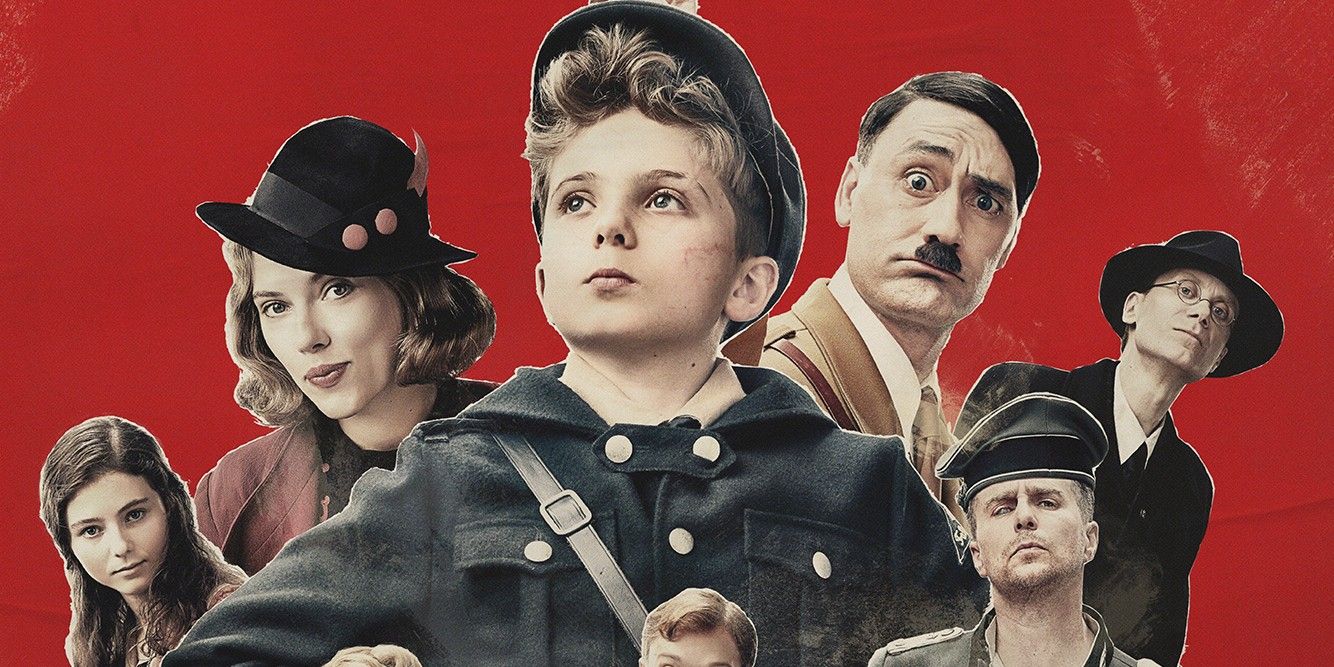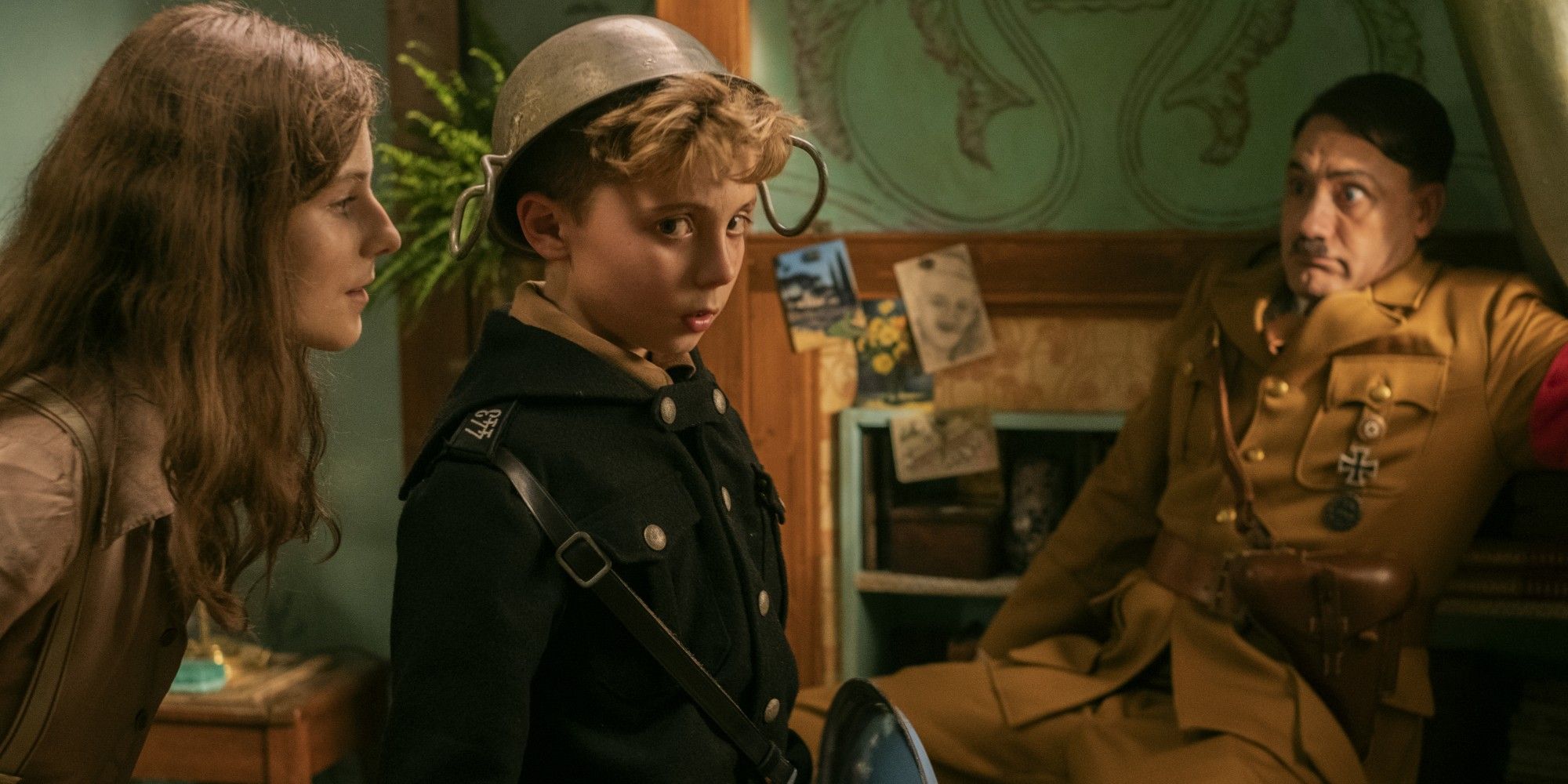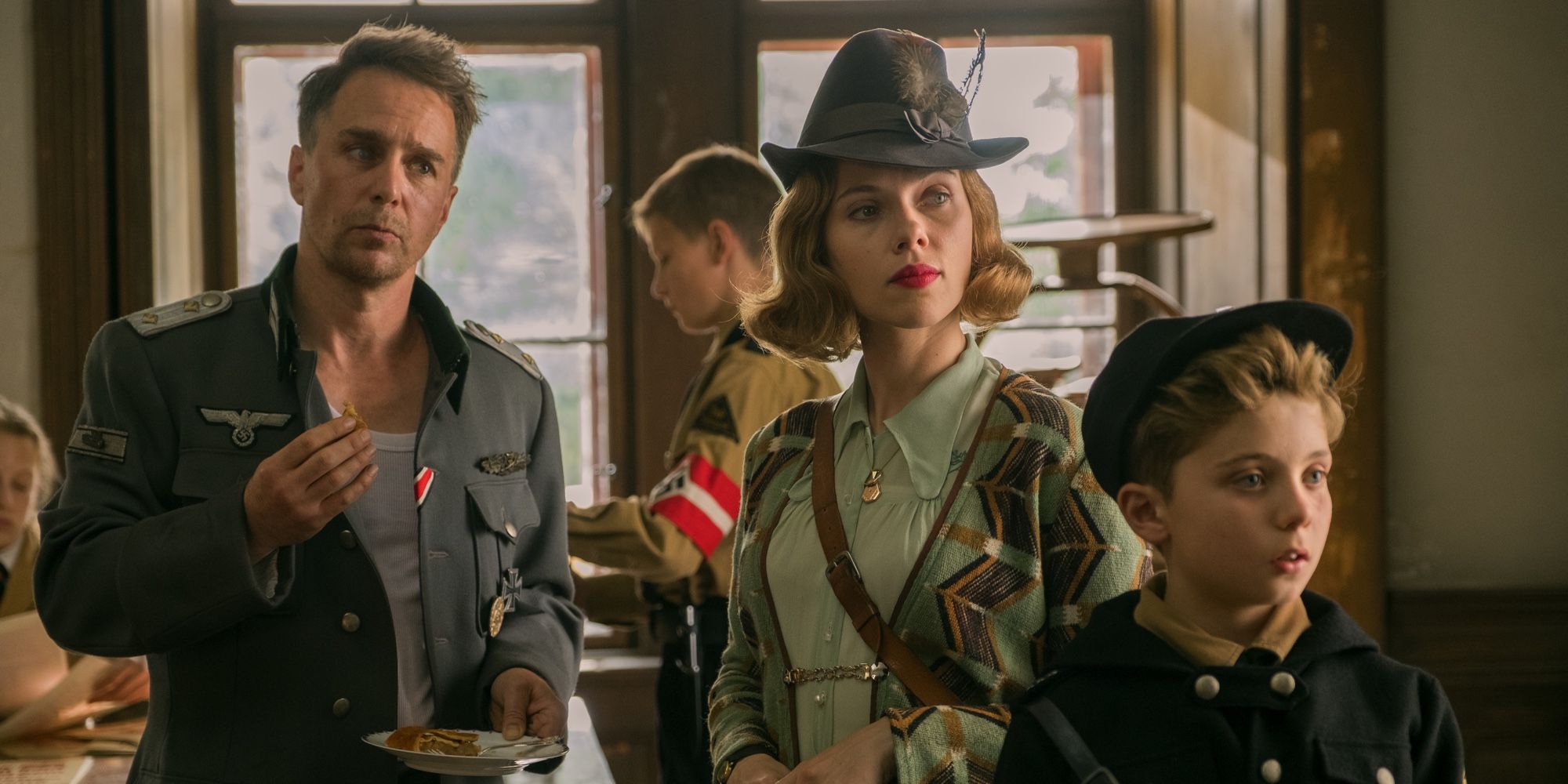Jojo Rabbit thrives as both an intrepid satire and a sincere coming of age dramedy, seamlessly blending wacky humor with genuine heartbreak.
Despite what Disney and Fox Searchlight's trailer marketing might lead you to believe, Taika Waititi's Jojo Rabbit is neither the quirky New Zealander's riff on Charlie Chaplin's The Great Dictator, nor the feature-length version of Mel Brooks' fake "Springtime for Hitler" musical from The Producers. Rather, it's another rich piece of happy/sad cinema (e.g. movies that weave comedy and tragedy together) about a lonely and misfit protagonist, in the vein of Waititi's Kiwi films like Eagle vs Shark and Hunt for the Wilderpeople. Thankfully, under his guidance, this idiosyncratic tale of a Hitler Youth also avoids being 2019's answer to Roberto Benigni's problematic Oscar-winner, Life is Beautiful. Jojo Rabbit thrives as both an intrepid satire and a sincere coming of age dramedy, seamlessly blending wacky humor with genuine heartbreak.
Set during WWII, Jojo Rabbit revolves around one Johannes "Jojo" Betzler (Roman Griffin Davis), a 10-year old German boy obsessed with becoming a Nazi. But when an attempt to prove his mettle at a Hitler Youth training camp goes spectacularly wrong, it earns him the cruel nickname "Jojo Rabbit" and gets Jojo sent back to recover with his mother, Rosie (Scarlett Johansson), instead. Still determined to prove his devotion to the Führer, Jojo subsequently agrees to perform tasks like distributing propaganda leaflets in his hometown, even as whispers of Germany's imminent defeat continue to spread and more and more resistance fighters are publicly executed for their deeds. Then, one day, Jojo discovers his mom has been hiding a young Jewish girl named Elsa Korr (Thomasin McKenzie) in their house, yet finds himself torn over what to do... and not even his best friend, imaginary Hitler (Waititi), seems to have the answer.
Adapted from Christine Leunen's book Caging Skies, Jojo Rabbit (which Waititi wrote and directed) touches on many of the same themes as Waititi's previous non-franchise efforts, like how isolation can impact people psychologically and affect their response to the society around them. By combining satirical humor with sincere drama the way it does, the film is able to express real empathy for Jojo and illustrate how his loneliness and insecurities lead him to embrace the hateful ideology of the Nazis. Waititi's movie simultaneously tears the image of Nazi Germany down without trivializing their championing of white supremacy or the horrors they inflicted (or helped cause) during the Second World War in the process. Jojo Rabbit might be full of witty jokes and clever visual gags, but it's able to pause and be gravely serious when the occasion calls for it, shifting from zany to somber with acrobatic precision.
From a character standpoint, Jojo Rabbit is also willing to put in the work to fully earn Jojo's gradual transformation from wannabe fascist to someone able to recognize that love and kindness are the ways out of his solitary existence, instead. In addition to his boyish charm, Davis brings an impressive degree of emotional nuance to his role as Jojo and is matched by Elsa, a great character whose mischievous nature masks her true pain. She's someone who's had to grow up far too fast without really living, and McKenzie's comfort with the role is further testament to her talent, following her moving turn in last year's Leave No Trace. The rest of the cast is similarly terrific; Johansson is sweet yet sad and resilient in equal measure as Jojo's mom, and Sam Rockwell is funny and compelling as Captain Klezendorf, the disillusioned leader of Jojo's Nazi Youth camp (whose own forbidden attraction to his second in command, Alfie Allen's Finkel, quietly informs his arc).
Jojo Rabbit still has its faults, but they're more cosmetic than anything else. For example, the pacing during the second act is a bit uneven compared to the movie's energetic opening and its powerful climax. Waititi's filmmaking style is similarly derivative of other directors at times, especially when it comes to his Wes Andersonian use of slow-motion and vintage song needle drops (here, of course, the tunes are in German). But again, the parallels to Anderson's work (Moonrise Kingdom during the youth camp scenes, The Grand Budapest Hotel in its happy/sad critique of Nazism) are mostly surface-level, and Waititi settles fully into his own rhythm the further along Jojo Rabbit goes. He even delivers a memorable performance as imaginary Hitler along the way, allowing his biting caricature to function as the manifestation of Jojo's evolving psyche and serve as a great visual representation for the character's internal conflict.
Despite winning the top prize at the 2019 Toronto International Film Festival, Jojo Rabbit is already one of the most divisive awards season releases of the fall, and for completely understandable reasons. It's tonal balancing act isn't going to work for everyone and some may find its rebuttal of white supremacy to be well-intentioned, but ineffective in action. For others, though, Jojo Rabbit will be happy/sad cinema at its finest and a meaningful (not to mention, darkly hilarious and tearjerking) WWII satire that actually finds something new to say about Nazi Germany and fascism altogether. Whichever way one falls, it's hard not to at least admire an Oscar contender for being as daring and otherwise eccentric as this one is.
TRAILER
Jojo Rabbit is now playing in select U.S. theaters and will expand to additional markets over the upcoming weeks. It is 108 minutes long and is rated PG-13 for mature thematic content, some disturbing images, violence, and language.



